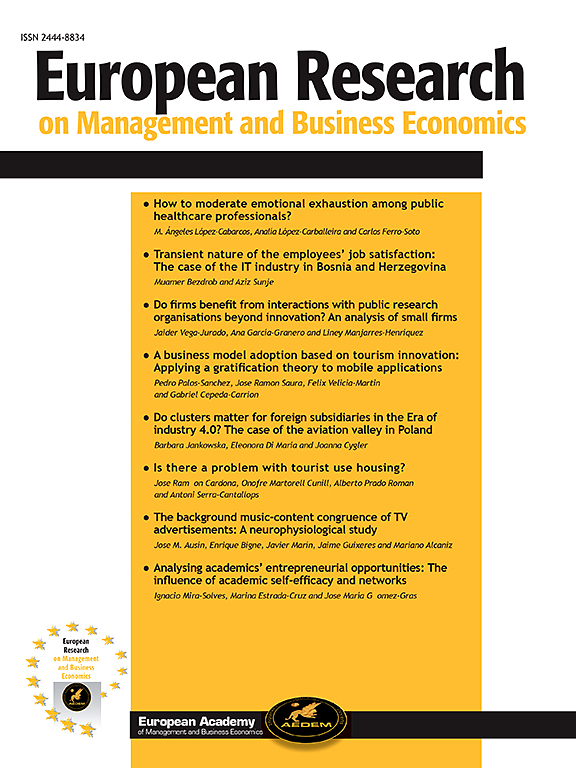Innovative governance for the future: Will gender diversity on boards enhance business performance in the European insurance industry?
IF 6.4
3区 管理学
Q1 BUSINESS
European Research on Management and Business Economics
Pub Date : 2025-05-01
DOI:10.1016/j.iedeen.2025.100283
引用次数: 0
Abstract
Recently, advocacy for gender diversity in corporate governance has intensified, following the hypothesis that heterogeneous boards can optimize management processes and improve financial performance. Existing literature primarily focuses on the banking or financial industry, with limited research on European insurers. Using a sample of 22 insurers included in EUROSTOXX 600 index over 2013–2023, a dynamic panel data model is employed to assess the impact of the presence of women on board and chair positions on Return on Equity (ROE) and Return on Assets (ROA), effectively accounting for unobserved firm characteristics and time-varying data. The results reveal that a female CEO increases performance by 0.3 %, higher female board representation improves returns by 3 %, and a smaller pay gap increases performance by 1 %. On the contrary, the existence of a quota does not have a significant influence due to issues with its design and implementation. These findings support the need to increase the number of women on insurers’ boards to enhance performance and strengthen a company's ethical standing and social responsibility. They are consistent with the literature review, underscoring the significance of gender equality policies in management for enhancing efficiency and innovation in the insurers’ future.
面向未来的创新治理:董事会性别多元化是否会提高欧洲保险业的业务绩效?
最近,根据异质董事会可以优化管理流程和改善财务绩效的假设,倡导公司治理中的性别多样性得到了加强。现有文献主要集中在银行或金融行业,对欧洲保险公司的研究有限。本文以2013-2023年欧洲斯托克600指数中的22家保险公司为样本,采用动态面板数据模型评估女性董事和董事长职位对股本回报率(ROE)和资产回报率(ROA)的影响,有效地考虑了未观察到的公司特征和时变数据。结果显示,女性首席执行官的绩效提高了0.3%,女性董事会成员的增加使回报提高了3%,而较小的薪酬差距使绩效提高了1%。相反,由于配额的设计和执行存在问题,配额的存在不会产生重大影响。这些发现表明,有必要增加保险公司董事会中女性的数量,以提高业绩,加强公司的道德地位和社会责任。他们与文献综述一致,强调性别平等政策在管理中的重要性,以提高保险公司未来的效率和创新。
本文章由计算机程序翻译,如有差异,请以英文原文为准。
求助全文
约1分钟内获得全文
求助全文
来源期刊
CiteScore
11.70
自引率
3.40%
发文量
30
审稿时长
50 weeks
期刊介绍:
European Research on Management and Business Economics (ERMBE) was born in 1995 as Investigaciones Europeas de Dirección y Economía de la Empresa (IEDEE). The journal is published by the European Academy of Management and Business Economics (AEDEM) under this new title since 2016, it was indexed in SCOPUS in 2012 and in Thomson Reuters Emerging Sources Citation Index in 2015. From the beginning, the aim of the Journal is to foster academic research by publishing original research articles that meet the highest analytical standards, and provide new insights that contribute and spread the business management knowledge

 求助内容:
求助内容: 应助结果提醒方式:
应助结果提醒方式:


